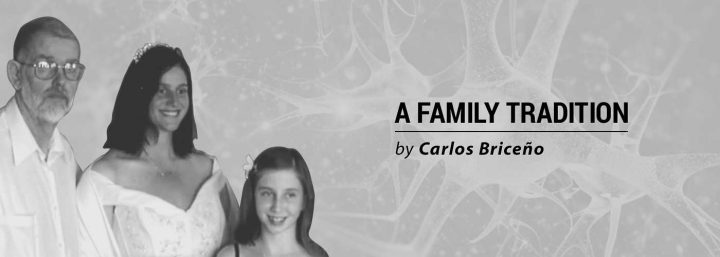It’s Not About You, Caregivers

I am messy.
I’ve always been messy.
My desk at work looks like an explosion of papers. I love to read, so it’s not uncommon for my bedroom floor to have books scattered like leaves on the ground on a fall day.
I also tend to buy the same product multiple times, so as not to run out. Last year, when I had the flu, I bought a bunch of NyQuil, DayQuil, several generic cold/sinus medicines (in case they worked better), and bottles of elderberry. There was enough medicine to treat a small village.
This weekend, I learned a valuable realization: I’m a hoarder. As a result, there is a lot of clutter at home. I know I’m a hoarder because my wife, Jill, who has Huntington’s disease, has recently been watching “Hoarders,” and she pointed out that I’m like the people featured on the show.
She has been asking me lately to organize the books on the floor and clean several spots in our home, including a few closets. And I’ve been lackadaisical in my response, partly because I don’t like to organize, but mainly because of the psychological reasons that lead a person to hoard.
Frustrated, and also irritated by a recent bout of hives, Jill yelled at me. When she does, she gets my attention because it’s so rare. Clutter is not something she needs in her life. It makes her anxious to see it, and it annoys her because she prefers a tidy home.
She does not need stress in her life.
I realize this and have been trying to reduce her stress in various ways. For instance, I try to always drive the car. (Jill has been known to get a tad annoyed with other drivers at times.) When standing in a store line — Walmart’s line is a prime example — there are many overlapping sensory distractions: kids crying, the register beeping, the hubbub of voices in a crowded line. Overloading on a lot of nearby sensory noises overwhelms her, so I usually tell her that she can wait outside where it’s relatively peaceful, while I deal with putting the groceries on the conveyor belt and completing the transaction.
But in this particular case, I was neglectful in my organizing and cleaning, and she got justifiably angry at me.
I felt awful. I was wrong.
I apologized. I cleaned. I organized. I learned an important lesson as her caregiver: I must overcome whatever holds me back from helping her in any area of her life. I need to be there for her. I can’t fail her. I have to do my best to protect her from stress and from anything that will make her feel like I’m not caring for her.
Rule 101 as a caregiver: It’s not about you; it’s about the person you love. You have to make their lives easier. So I resolve to do that in the future, especally when it comes to organizing, cleaning, and decluttering our home.
***
Note: Huntington’s Disease News is strictly a news and information website about the disease. It does not provide medical advice, diagnosis, or treatment. This content is not intended to be a substitute for professional medical advice, diagnosis, or treatment. Always seek the advice of your physician or other qualified health provider with any questions you may have regarding a medical condition. Never disregard professional medical advice or delay in seeking it because of something you have read on this website. The opinions expressed in this column are not those of Huntington’s Disease News or its parent company, Bionews Services, and are intended to spark discussion about issues pertaining to Huntington’s disease.







Mary
Very true. It's extremely important to reduce as many stressors for the HD person as possible. It will make both your lives easier.
Carlos Briceño
Thank you for what you shared!